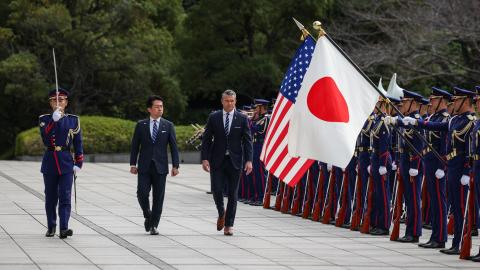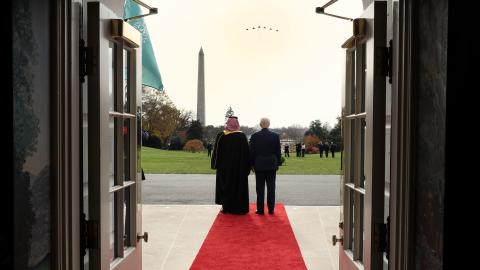Sanctions have become the default hammer designed by Congress to fill the void left by the bewildering flattery of Vladimir Putin by President Trump. A credible legislative message should indeed be sent in response to continued and future Russian misdeeds, including election meddling and irredentism. But Congress may be overlooking a straightforward and systemic solution that would go beyond either haphazardly targeting individuals or the entire Russian economy.
The effectiveness of current approaches in deterring Kremlin misconduct is contested, but their propensity to severely disrupt global supply chains is proven. Reports of new sanctions bills sent the Russian ruble into freefall. The sanctions mallet affects economic outcomes, but in battling a politically revisionist Putin, those advocating a sanctions strategy should remain cognizant that there is still opposition to Putin in Russia, and there are plenty of Westerners that work and invest there. When ordinary Russians, Americans, and Europeans start losing their jobs as an unintended consequence, sanctions legislation runs the risk of playing straight into Putin’s hands.
The Defending American Security from Kremlin Aggression Act (DASKAA) has the potential to be an effective deterrent to bad Russian behavior, but to be credible it needs two things. First, the clear support of U.S.-based multinational firms across all sectors. Second, language to provide a tool for truly undermining the economic foundations of Putin’s authoritarian kleptocracy: a provision requiring corporate beneficial ownership transparency.
This might seem like a surprising observation, but beneficial ownership requirements are key to tracking down the personal wealth of the Putin oligarchy, much of which is believed to be sitting in the form of American and British real estate. Tucked in the back of the 104-page, leaked DASKAA draft is a provision to make an obscure Treasury Department pilot scheme, called Geographic Targeting Orders (GTOs), nationwide and permanent. GTOs require title insurance agents in certain U.S. jurisdictions to disclose the identity of customers behind shell companies used in high-value real estate deals. Since they were introduced in 2016, GTOs have driven the volume of such deals down by a staggering 95 percent in Miami and 70 percent nationwide. If the customers behind the shell companies purchasing property have innocent intentions, what explains their sudden flight when asked to divulge their identities to U.S. law enforcement?
GTOs might seem out of place in a Russian sanctions bill, but they drive straight at the contemporary model of transnational kleptocracy Oligarchs and corrupt officials rely on the ability to spirit stolen money out of Russia, bounce it through offshore secrecy havens, and stash it in real estate in Miami, New York, and other glamorous locations around the world. Often, the money is just there for safekeeping. But members of the Russian elite are frequently beholden to the Kremlin.
Once their illicit funds have been safely integrated into the U.S. economy, they can be deployed for darker purposes, such as election meddling, influence peddling, assassinations, bribery, and hiring thugs back in Russia to harass opposition groups and independent media. This process not only corrupts and undermines our own democratic, legal, and financial institutions, but it also distorts markets and decreases the profitability of American firms. This corrosive dynamic is a major reason why U.S. businesses should support deterrence efforts like DASKAA and demand it include a provision on beneficial ownership.
A beneficial ownership rule needs to be applied broadly and overseen by the U.S. Treasury Department for two reasons. First, there are few ways of knowing which companies are Russian. After all, oligarchs do not name them “Putin’s Laundry LLC.” Second, a Treasury due diligence (beneficial ownership) database would make American markets more competitive, as it will reduce the quickly growing costs of compliance departments.
Another DASKAA provision illustrates why this is so important in practice. DASKAA would establish a “National Fusion Center” to counter the hybrid threat posed by Russian aggression, including “the covert transfer of illicit funds through shell corporations and financial institutions to facilitate corruption, crime, and malign influence activities, including through political parties and interest groups.”
This is a welcome and overdue measure, but impossible to enact without an accompanying beneficial ownership provision. How are U.S. intelligence agencies and law enforcement supposed to monitor shell corporations for malign Russian activity when they have little in the way of knowing who owns or controls them? For that matter, how are sanctions under DASKAA — or the Magnitsky Act, CAATSA, and broader counter-terrorism regime — supposed to be enforced when U.S. law enforcement can’t see who owns what in its own country?
When one shines a light on pests, they either freeze or scatter. In this case, that light is a credible threat that there will be consequences. Sanctions are important, but tackling the corporate secrecy on which Putin’s regime depends is what he fears most. Adding a beneficial ownership provision and securing the support of American multinational businesses will make the light of legislation like DASKAA shine even stronger.


















